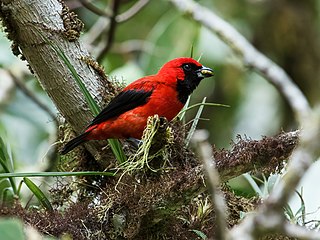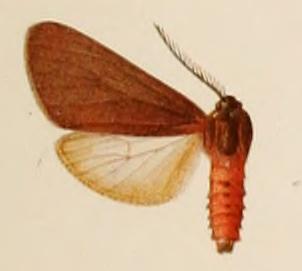
Yucca is a genus of perennial shrubs and trees in the family Asparagaceae, subfamily Agavoideae. Its 40–50 species are notable for their rosettes of evergreen, tough, sword-shaped leaves and large terminal panicles of white or whitish flowers. They are native to the hot and dry (arid) parts of the Americas and the Caribbean.

Euchaetes egle, the milkweed tiger moth or milkweed tussock moth, is a moth in the family Erebidae and the tribe Arctiini, the tiger moths. The species was first described by Dru Drury in 1773. It is a common mid- through late summer feeder on milkweeds and dogbane. Like most species in this family, it has chemical defenses it acquires from its host plants, in this case, cardiac glycosides. These are retained in adults and deter bats, and presumably other predators, from feeding on them. Only very high cardiac glycoside concentrations deterred bats, however. Adults indicate their unpalatability to bats with ultrasonic clicks from their tymbal organs.

The vermilion tanager is a species of Neotropical bird in the tanager family Thraupidae. It is the only member of the genus Calochaetes.

Euchaetes is a genus of moths in the family Erebidae. It was described by Thaddeus William Harris in 1841.

Euchaetes fusca is a moth of the family Erebidae. It is found from the south-western United States to Costa Rica.
Euchaetes albaticosta is a moth of the family Erebidae. It was described by Harrison Gray Dyar Jr. in 1912. It is found in Mexico.
Euchaetes albicosta is a moth of the family Erebidae. It was described by Francis Walker in 1855. It is found from Texas, south to Mexico and Nicaragua.
Euchaetes antica is a moth of the family Erebidae. It was described by Francis Walker in 1856. It is found from Arizona and New Mexico in the US, south to Mexico, Nicaragua, Honduras and Guatemala.
Euchaetes bicolor is a moth of the family Erebidae. It was described by Walter Rothschild in 1935. It is found in São Paulo, Brazil.
Euchaetes castalla is a moth of the family Erebidae. It was described by William Barnes and James Halliday McDunnough in 1910. It is found in the US state of Arizona.
Euchaetes elegans, the elegant pygarctia, is a moth of the family Erebidae. It was described by Richard Harper Stretch in 1874. It is found in the US states of California, Arizona, New Mexico, Nevada and Texas, and in Mexico, Guatemala, Panama and Colombia.
Euchaetes pannycha is a moth of the family Erebidae. It was described by Harrison Gray Dyar Jr. in 1918. It is found in Mexico.
Euchaetes perlevis is a moth of the family Erebidae. It was described by Augustus Radcliffe Grote in 1882. It is found in the US states of Arizona, New Mexico and Texas.
Euchaetes polingi is a moth of the family Erebidae. It was described by Samuel E. Cassino in 1928. It is found in the US states of Arizona, New Mexico, Oklahoma and Texas.
Euchaetes psara is a moth of the family Erebidae. It was described by Harrison Gray Dyar Jr. in 1907. It is found in Mexico.
Euchaetes rizoma is a moth of the family Erebidae. It was described by William Schaus in 1896. It is found in Brazil.

Euchaetes zella is a moth of the family Erebidae. It was described by Harrison Gray Dyar Jr. in 1903. It is found in the US states of Arizona, California, Nevada, New Mexico, Oklahoma and Texas.

A MONA number, or Hodges number after Ronald W. Hodges, is part of a numbering system for North American moths found north of Mexico in the Continental United States and Canada, as well as the island of Greenland. Introduced in 1983 by Hodges through the publication of Check List of the Lepidoptera of America North of Mexico, the system began an ongoing numeration process in order to compile a list of the over 12,000 moths of North America north of Mexico. The system numbers moths within the same family close together for identification purposes. For example, the species Epimartyria auricrinella begins the numbering system at 0001 while Epimartyria pardella is numbered 0002.






